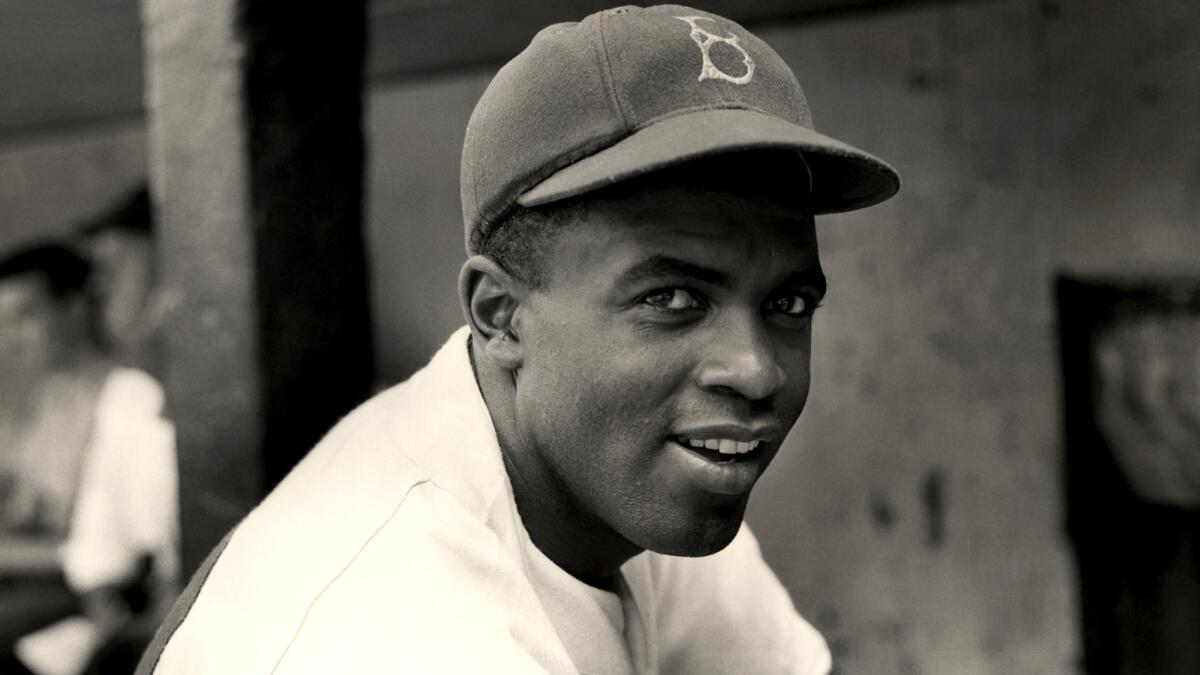Column: Ken Burns’ documentary on Jackie Robinson is full of surprise and fresh insight

When Jackie Robinson became an All-Star for the first time two seasons after his debut, he received more votes than any player except Ted Williams.
- Share via
Every few years, Ken Burns releases another epic — buttery and well-seasoned, the outside a little crisp. That the topic again is baseball is further reason to rejoice that spring is once again in the air.
Burns’ baseball work is as fluid as the game itself. Rarely rushed, slow by the standards of today’s jaggy sensibilities. Your kid’s soccer videos probably have more special effects.
That contrarian bent continues in his latest documentary, which Burns made with his daughter, Sarah Burns, and her husband, documentarian David McMahon.
As always, there’s an insistence on substance over style. This time, Burns and associates take on the life of Jackie Robinson, the grandson of slaves and one of western Pasadena’s finest works.
Where does this four-hour PBS documentary, which runs Monday and Tuesday from 9-11 p.m., rank among Burns’ best performances? To my mind, right up there, full of surprise and fresh insight. Like baseball, it is long, occasionally gritty and as rhythmic as a summer rain.
“I think the thing I miss the most is having a trusted friend,” Robinson’s widow, Rachel, says. “The second thing I miss the most is having his arms around me.”
In person, Burns, 62, is energized, boyish, still boasting that Beatles haircut. Able to talk about any topic with verve and humor, he’s sort of an emotional archaeologist, the Indiana Jones of American milestones. He also might be our nation’s most valuable historian.
“More Americans get their history from Ken Burns than any other source,” Stephen Ambrose once said.
Still, any subject matter can reach a fatigue point, even Robinson. Books, feature films, symposiums, tributes, statues, salutes. What more can you say about an icon who has been studied and revered about as thoroughly as most presidents?
Well, among the show’s most interesting disclosures:
• Though he was the target of death threats, many fans quickly embraced Robinson, voting him onto the All-Star team two years after his debut and giving him more votes than any player except Ted Williams.
• When Robinson moved his young family to Connecticut, they lived temporarily with the family of future singer Carly Simon, as Simon’s wealthy mother, Andrea, worked diligently to fight off local housing bias.
• After retirement, Robinson became buddies with Richard Nixon, campaigned for him in 1960, and shunned overtures from the Kennedys, particularly after JFK chose a Texan as his running mate. In any arena, Robinson “was his own man,” Rachel notes.
• During the militant protests of the ‘60s, Robinson struggled to stay relevant as a civil rights leader, alienating some whites who admired his earlier “turn the other cheek” approach while fellow blacks often dismissed him as an aging has-been.
But even as a player, Robinson didn’t always turn the other cheek. We learn how teammate Roy Campanella, the sixth black player in the major leagues, worried that Robinson’s fierceness on the field was divisive and hurting the team.
“Without that anger, you don’t get Jackie Robinson,” sportswriter Howard Bryant says in the documentary.
“He was not an angry black man,” Rachel says. “He was an athlete who wanted to win.”
Burns has an eye for the details you may have forgotten: How Robinson was only 33 when he was diagnosed with diabetes and a failing heart, in 1952, three years before he would help lead the Dodgers to their first World Series title.
The historic clips are phenomenal: There’s Robinson’s flat, beating-the-rug swing; the trademark smile; the way he rounded the bases, exploding off the corner of the bag with his inside foot, like a sprinter encountering a second set of blocks.

Burns says friends are always after him to “lay off the race thing,” but it seasons nearly every topic he is interested in, and many of his most iconic works: on the Civil War, baseball, jazz, Jack Johnson.
“We are worse about race now than we were eight years ago,” Burns said.
His new documentary, full of joy, heartache and hate, leaves you to wonder: Will Americans ever reach a point where we stop talking about race? Does the very discussion of it ease tensions or prolong our divisions?
And how many messiahs do we really have left?
Follow Chris Erskine on Twitter: @erskinetimes
More to Read
Are you a true-blue fan?
Get our Dodgers Dugout newsletter for insights, news and much more.
You may occasionally receive promotional content from the Los Angeles Times.








